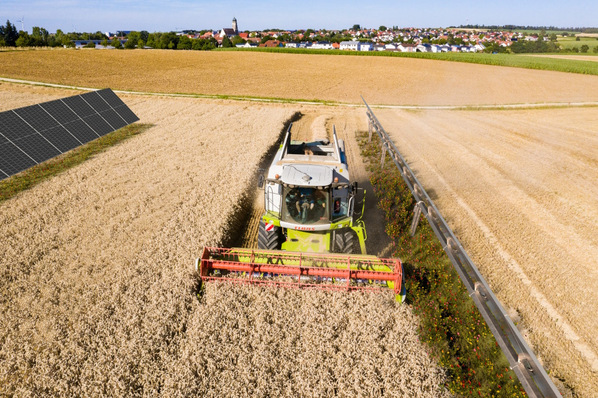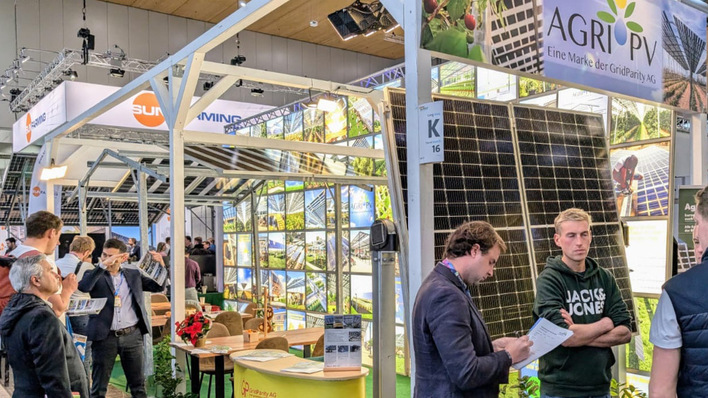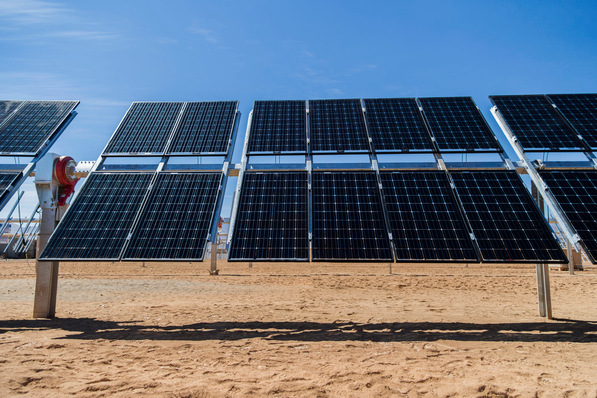BayWa r.e. and the Fraunhofer Institute for Solar Energy Systems ISE, together with other research partners, have built the first agri-PV research facility for apples and espalier fruit at the Nachtwey organic fruit farm in Gelsdorf in Rhineland-Palatinate. It is the first facility of its kind in Germany. The total test area of the research project "Agri-PV Fruit Growing" covers approx. 9100 m², the Agri-PV system was installed with an output of 258 kWp on approx. 1/3 of the area of the site.
The overall objective of the project, which is funded by the Ministry of the Environment, Energy, Food and Forestry of Rhineland-Palatinate (MUEEF) and the Federal Ministry of Food and Agriculture (BMEL), is to increase climate resilience in fruit growing and to ensure safe and sustainable apple production with additional solar power generation.
Within the framework of the project, which has a total duration of five years, numerous factors are to be investigated on eight apple varieties.
Different crop protection systems and light management tested
The project first compares apple production at the same location under three different crop protection systems: Film protection (non-rain permeable), hail protection (rain permeable) and Agri-PV with fixed translucent PV modules (non-rain permeable) and tracked PV modules (rain permeable if required). The aim is to investigate the extent to which Agri-PV systems can protect plants and fruit from damaging environmental influences such as hail, heavy rain, sunburn, frost or extreme temperatures.
Furthermore, it will be tested to what extent different light management through different PV module configurations has an impact on plant growth and agricultural yields. Furthermore, the system will be examined with regard to landscape aesthetics, economic efficiency, social compatibility and crop production parameters.
Stephan Schindele, Head of Product Management Agri-PV at BayWa r.e. comments on the project: "We see Agri-PV as a long-term solution to help farmers adapt to the consequences of climate change. We can preserve the existing ecosystem and even enhance it through synergy effects and solar power generation."
Also demonstrate economic benefits for farmers
"After having very successfully realised professional berry cultivation under Agri-PV in the Netherlands, we are taking the important step towards espalier fruit in Gelsdorf. We have recognised that the potential and synergies for Agri-PV combined with apple, pear, cherry, kiwi and other permanent crops can be considerable. We want to tap this potential permanently and enable further expansion of photovoltaics without limiting agricultural yields."
In addition to adapting to climate change and protecting agricultural assets, the Agri-PV project in Gelsdorf also aims to demonstrate economic benefits for farmers. These include permanently lower and more calculable energy costs, lower investment costs in crop protection, and lower input and waste disposal costs.
Andreas Steinhüser, Deputy Group Leader Agri-Photovoltaics at Fraunhofer ISE, adds: "The research project "Agri-PV Fruit Growing" is not only intended to show ways of reducing CO2 emissions in agriculture, but also to avoid the use of short-lived materials and the use of pesticides and fungicides, thus making a decisive contribution to climate protection. In addition, we are also focusing on social issues such as acceptance and social compatibility, as these aspects will play a decisive role in the further spread of Agri-PV."
Electric tractor charged with electricity from the plant
The electricity generated by the Agri-PV system can be used upstream and downstream of apple production. On the one hand, the battery-electric Fendt 100 Vario tractor provided by AGCO GmbH is charged with electricity from the plant. On the other hand, the energy is also used to supply the irrigation system with Agri PV's own electricity. The cold store is already supplied with green electricity from a PV roof system. Overall, the implementation of an operational energy concept seeks to significantly reduce CO2 emissions on the farm through solar electrification.
In addition, BayWa r.e. can draw on the long-standing expertise in fruit growing of the parent company BayWa AG. The film and hail protection systems next to the Agri-PV plant in Gelsdorf were implemented by BayWa Agrar Obst und Hopfenzentrum from Tettnang. Plant physiological monitoring is made possible by "NEXT Farming". With the help of this software management system from BayWa AG, farmers can control their entire operation as well as irrigation. Through data monitoring and weather forecasts, farmers are continuously informed about possible risks in order to be able to control their cultivation.
Combine high quality apple production and power generation
Benedikt Ortmann, Global Director of Solar Projects at BayWa r.e., summarises: "In Europe in particular, we see enormous potential for agri-PV applications in fruit growing, as there are large areas under cultivation. With this research project, we want to show how sustainable, high-quality apple production can succeed and at the same time advance the energy transition. Together with agriculture, we are thus creating a win-win situation for everyone in the fight against climate change, 'enjoyment without regret', so to speak."
Did you miss that? New guideline for agrivoltaics
In addition to BayWa r.e. and Fraunhofer ISE, the research partners involved in the project are DLR Rheinpfalz (agricultural science), Fendt, EWS Schönau and the Nachtwey organic fruit farm. (hcn)
Also interesting: Heiko Hildebrandt from Next2Sun: Agriculture, nature conservation and solar systems in harmony







